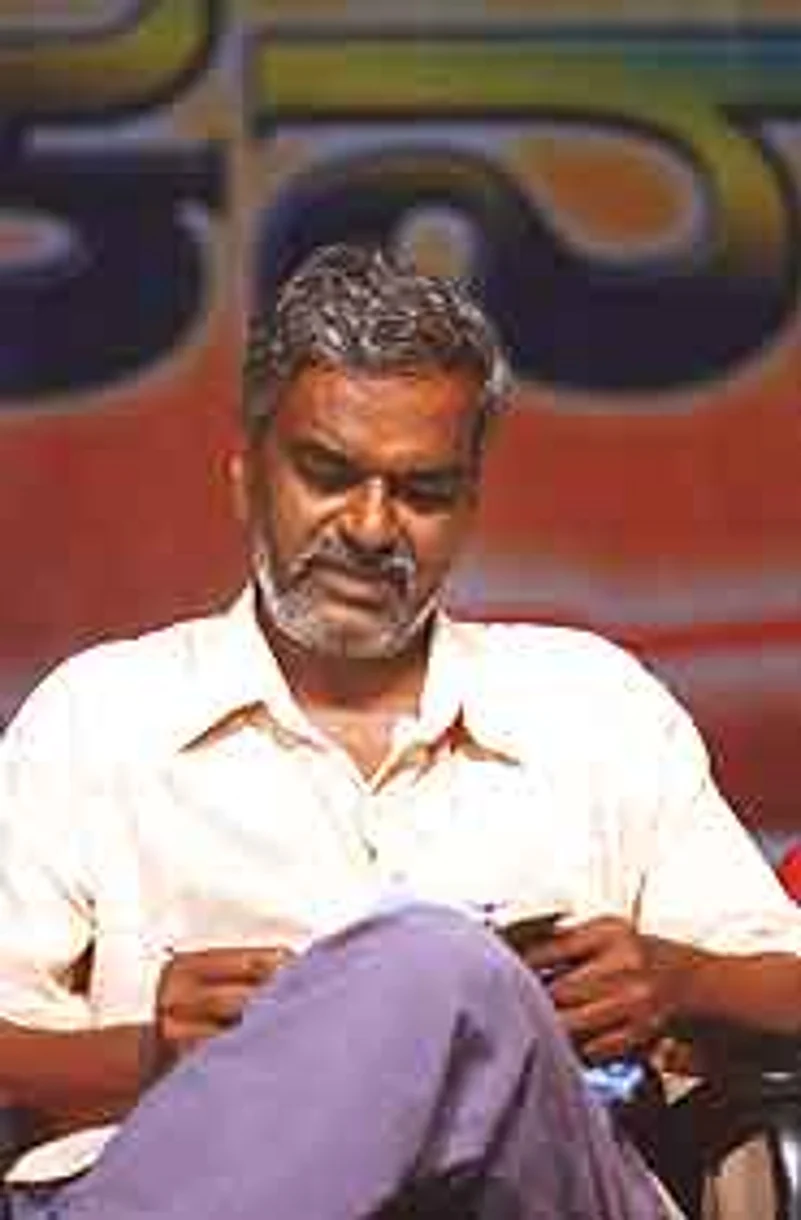This description, well, suits Devanur Mahadeva, a writer par excellence inthe Kannada language; the author of the classic novel Kusumabale; thewinner of the Sahitya Akademi award; a former writer in residence at IowaUniversity who has been translated into English by none other than the legendaryA K Ramanujan. But would this description also suit the president of a politicalparty, when simplicity and ideation have become anachronistic in our politicalculture? Mahadeva hopes the ground rules will change in the state with thepolitical party, Sarvodaya Karnataka, that he has helped found less than a monthago.
Mahadeva's new party claims the legacy of Buddha, Basavanna, Gandhi, Ambedkar,Lohia, Devaraj Urs and Gopala Gowda. "Ours will be a Democratic Socialistparty in the true sense," he says. The low-key launch of this party was acontrast to the launch of Mulayam Singh's Samajavadi Party around the same timein Bangalore. This new party is also about the fulfilling of the dream of apolitical party that Rammanohar Lohia and Ambedkar together dreamt of launchingaround 1956, but aborted due to the death of Ambedkar.

The constituency that Sarvodaya party tries to primarily address is that ofDalits and farmers, but will include all the marginalised and socially disabled(in the context of globalisation) sections of the society, including women. Somefactions of the Raitha Sangha and the Dalit Sangharsha Samithi, which have someprevious electoral experience, have come together to form this party, whileserious efforts are on to bring all the other Dalit and farmers organisations inthe state together. "This party will help Dalit and farmers' organisationsto come out of their trade unionist mindset and think of forging alliances witha larger interest."
In some ways, the bringing together of farmers and Dalits, who havetraditionally had the relationship of landlords and bonded labourers, is seen asa social revolution, a simulation of the 12th century Veerashaiva movement inKarnataka. "In a rural setting, socially and culturally a Dalit and afarmer are the same, it is just the artificial varna caste line that separatesthem and we want to blur that permanently," says Mahadeva and adds:
"At the moment we are standing one above the other in a pyramidal structure, in this structure the one at the bottom is seen as the sinned. To keep this structure we have misused the names of gods. In Christianity, if a black man enters the fold, the white man does not think that the god will be angry, but here we think we have enraged the gods when a Dalit enters the Hindu fold. We want to change this, we want to make people stand next to each other. By removing the static pyramid we make social relationships dynamic and we want to achieve this without violence."
But what with the fact that caste politics in post-Independent India hasalways had a militant approach? Mahadeva, who is himself a Dalit, says that theanger and hurt needs to be converted into a constructive programme.
So what's the constructive programme of the Sarvodaya party? Mahadevahighlights two things from a big list: One, is to teach and encourage farmers tofollow the methods of natural farming, "by this we will ensure that themultinational companies that sell pesticides and genetically engineered seedswill commit suicide instead of our people." Two, to tap knowledge and otherresources of people who have migrated out of villages under the 'Do your bit foryour village' programme. "At no point do we want to tell people to emulatethe Mahatamas, on the other hand we want to recognise little Buddhas and Gandhisamong them," says Mahadeva.

Mahadeva's Sarvodaya party has also consciously decided to give up theculture of erecting cutouts, burning effigies, shouting 'murdabad' and callingfor a bandh. "We want to bring in a new constructive political culture, wewant to go to the people with not the idea of protest but with a programme thatwill ameliorate their daily living," he says.
But when we ask Mahadeva for a pragmatic analysis of his party's chances atthe hustings, he says:
"We are not afraid of failures, all that we want to do is to to provide a robust opposition party in Karnataka, because all major political parties are eternally waiting to share the spoils of power. We also do not want parties with obstinate ideological positions to rule the state. The ones who either give primacy to God or violence in their ideologies, I mean the BJP and the Naxals. These people would have disastrous consequences on our social fabric. Ideally, ideology should be like grammar, something that should be forgotten after the language is learnt."
The Sarvodaya Karnataka party and Mahadeva's involvement in politics hasgenerated such positive vibes and intellectual curiosity in the state in thelast couple of weeks that it is reminiscent of the excitement of Neruda'sinvolvement in Chilean politics in the '60s. But the last word came from Kannadacultural icon Rajkumar. In a private conversation he said: "I alwaysthought that politics was about girding your loins and throwing muck at eachother. If I only knew that politics can be practiced in this simple, straightand sincere fashion, I would have entered it long back."
The only word of criticism being heard about the new party is "Naïveté".But then the same people agree that hope should be given a big chance.























